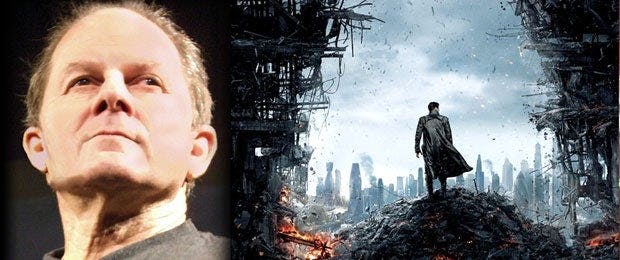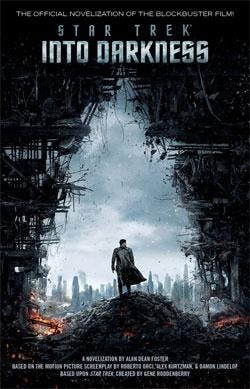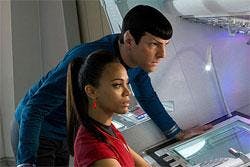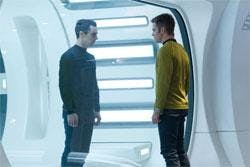Published May 22, 2013
EXCLUSIVE: Star Trek Into Darkness Novelist, Alan Dean Foster Part 2
EXCLUSIVE: Star Trek Into Darkness Novelist, Alan Dean Foster Part 2


Now, you know as well as we do that people have issues with certain elements in the film. That’d be the case with any film, but it’s especially the case with Star Trek. How do you as the writer, when you’re hired to work from someone else’s material, ignore whatever questions you might have?FOSTER: This is a work-for-hire. It’s not my work. I’m kind of like a contractor who’s building a house according to an architect’s blueprints and the homeowner’s wishes. The architect and the homeowner are in control. If they want to paint the kitchen puce, even though I may object to that for all sorts of reasons, then it’s my job to paint it puce. I will try to fix things and I will try to rationalize things, but I can’t simply throw something out and throw something else in. That’s just not the way it works. I don’t have that kind of control. When I say I can make my own director’s cut, there are limitations to that, obviously. I also can’t directly contradict something that appears in the film. If there’s a scene where Kirk and Spock are arguing and I want to have Kirk say, oh, something a little less than pleasant about Spock, but then the filmmakers say, “We don’t want the scene to be that harsh. We don’t want the dialogue to be that sharp,” I have to take it out because it is, in the end, a work-for-hire.Some fans, having seen the film, don’t really understand Khan’s motivations, why he does what he does. What’s your understanding of what he is so mad about and why he’s taking it out on Starfleet?FOSTER: Oh gosh. There are certain things dramatically that you might want to expand upon in a film that you just don’t have time to do if you want to include if you want to do other things. Khan is angry at Starfleet because… It’s one of the things I tried to expand upon more in the book. Here you go: Khan has this deal with the admiral, and the deal is that if Khan helps the admiral develop these new weapons, principally the big ship we see, the Vengeance, all of its technology and everything, so that that the admiral can have his war with the Klingons, then the admiral will restore Khan’s crew to him on his ship. This is the only family that Khan has. These are all genetically engineered people like Khan. They’re the only people in the world like him. And the admiral doesn’t do it. He reneges on the deal, and that prompts Khan to go off and say, “Well, if you’re not going to restore my people to me, I’m going to have to find a way to do it,” and the way he tries to do it is he smuggles his people onto the Enterprise in the hopes that he’ll be able to revive them. I admit it gets a little confusing in places. If I were Khan, it’s not necessarily the way I would have done it. OK, how about the universal translator, or lack thereof? Uhura speaks Klingon to the Klingons.


FOSTER: Well, she’s a communications officer, and that’s her specialty, languages and communication. Keep in mind that the filmmakers have to keep in mind that this is not hard science-fiction. This is science fiction where you’re trying to appeal to as wide an audience as possible. If you’ve followed all this, people are probably aware that the 2009 film did not do nearly as well overseas, proportionately, as such films tend to do. The studio has made a huge effort, this time around, to try to make it more appealing to the overseas portion, where a large proportion of receipts come these days. That may force certain changes in a film that everybody concerned may not want to make – and I don’t know that this is true (in this instance) – in order to accommodate a wider audience. One of those things is making such confrontations more personal. If Uhura is speaking into a translator, and the translator is speaking for her, then you don’t have the kind of individual to individual interaction you have if Uhura is speaking to the Klingons herself.Orci also oversaw IDW’s Star Trek Into Darkness comic-book prequel miniseries. Did you tie in any elements of that?FOSTER: No. I was not given the comic-book prequel. That’s just as well. I didn’t want anything to pre-prejudice me while I was doing the book. And they obviously felt it was better to keep such things separate.In a perfect world, would Star Trek fans see the movie and then read the book or read the book and then see the movie?FOSTER: I think they’d go see the movie first, and I’ll tell you why? After having been doing this for 40 years I have some small insight into that, and I’m not trying to flatter myself here. I’m just telling you what people have said. Alien is a good example. People who said they read the book before the film said they were disappointed in the film, and they shouldn’t have been disappointed in the film because it’s a terrific film. Now, not everybody said that, but enough people said that and said that about other books that I’ve done, to where it’s fairly obvious that I have, in a book, much more time to develop things and unlimited budget. It’s an unfair comparison with a film. So I think it’s much better if people see this film first and then get the book later. It’s like tasting a new dessert. You taste it first, and then you go and buy the whole thing and enjoy it at your leisure. You don’t buy the whole thing and then somebody offers you a taste later. You’ll say, “I’ve already eaten the whole thing. Why do I want just a taste?”Last question: What else are you working on these days?FOSTER: I have several short stories coming out and there are four or five film projects in development, which, of course, means nothing if you know about Hollywood. There’s a producer in Australia trying to turn my Spellsinger books into a couple of films. I’m working with a documentary filmmaker named Joel Burke on a near-future science-fiction film that would be shot entirely in China. A producer is trying to bring my Pip and Flinx books to the screen. So, after years of nothing going on cinematically, except me making books out of films, there are three or four simultaneous potential film projects going on.
Click HERE to purchase Foster’s Star Trek Into Darkness novelization. And click HERE to visit the author’s official site.
